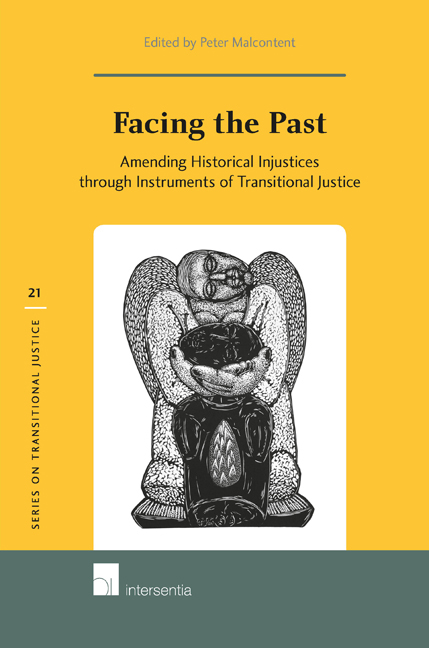Book contents
- Frontmatter
- Acknowledgements
- Contents
- PART I TRANSITIONAL JUSTICE. WHAT'S IN THE NAME?
- PART II RETRIBUTIVE JUSTICE
- PART III RESTORATIVE JUSTICE
- Introduction
- The Whole Truth and Nothing but the Truth? On the Role of Truth Commissions in Facing the Past
- Official Apologies
- Financial Compensation as a Political Process
- Education in the Shadow of History. Education, History Education, and Their Place in Historical Justice
- Governing through Repair. Historical Injustices and Indigenous Peoples in Canada
- PART IV PENDING CASES
- Author Information
Financial Compensation as a Political Process
from PART III - RESTORATIVE JUSTICE
Published online by Cambridge University Press: 15 December 2017
- Frontmatter
- Acknowledgements
- Contents
- PART I TRANSITIONAL JUSTICE. WHAT'S IN THE NAME?
- PART II RETRIBUTIVE JUSTICE
- PART III RESTORATIVE JUSTICE
- Introduction
- The Whole Truth and Nothing but the Truth? On the Role of Truth Commissions in Facing the Past
- Official Apologies
- Financial Compensation as a Political Process
- Education in the Shadow of History. Education, History Education, and Their Place in Historical Justice
- Governing through Repair. Historical Injustices and Indigenous Peoples in Canada
- PART IV PENDING CASES
- Author Information
Summary
INTRODUCTION
Financial compensation does not only complement other remedies generally, but also in a very particular way, namely by helping to keep those other remedies from fading into irrelevance for most victims. Moreover, in the absence of compensation, victims will always have reasons to suspect that even if other transitional procedures are applied with sincerity, the ‘new’ democratic society is one that is being constructed on their shoulders. By contrast, when – even under conditions of scarcity – funds are allocated to former victims, a strong message is sent to them about their inclusion in the political community.
The question therefore is not so much whether financial compensation could be a useful remedy to repair historical injustices. The question rather is how this restorative justice tool should be applied in order to be most effective. This chapter argues that financial compensation should be used as a flexible soft-law tool that is not necessarily implemented against the background of judicial proceedings, but instead as part of political negotiations between all involved parties. Indeed, including the right to financial compensation as a part of international human rights law (IHRL) and international humanitarian law (IHL) may help to contribute to a generalised atmosphere of support, or an international ‘reparations ethos’, as Richard Falk calls it. But, at the same time history shows that a strict legal approach to the implementation of the right to compensation, by regarding it as black letter law and enforcing it as such through court proceedings, does not necessarily increase the effectiveness of this remedy at bringing about reconciliation and thereby long-term peace and security.
THE RISE OF FINANCIAL COMPENSATION AS A REMEDY IN INTERNATIONAL LAW
In 1907, financial compensation became a part of international law when this concept was included in The Hague IV Convention on the Laws and Customs of War on Land that in Article 3 expresses the duty of belligerent parties to compensate for injuries caused by their armies. However, the prevailing understanding continued to be that only states were subjects within the international legal order. Therefore, wrongs done to individuals by foreign armies were in fact inflicted upon a victim's state of nationality. Accordingly, if a victim was stateless, a national of the wrongdoing state, or a national of a state unwilling to support a claim for compensation, there was no basis on which to proceed.
- Type
- Chapter
- Information
- Facing the PastAmending Historical Injustices Through Instruments of Transitional Justice, pp. 265 - 284Publisher: IntersentiaPrint publication year: 2016



